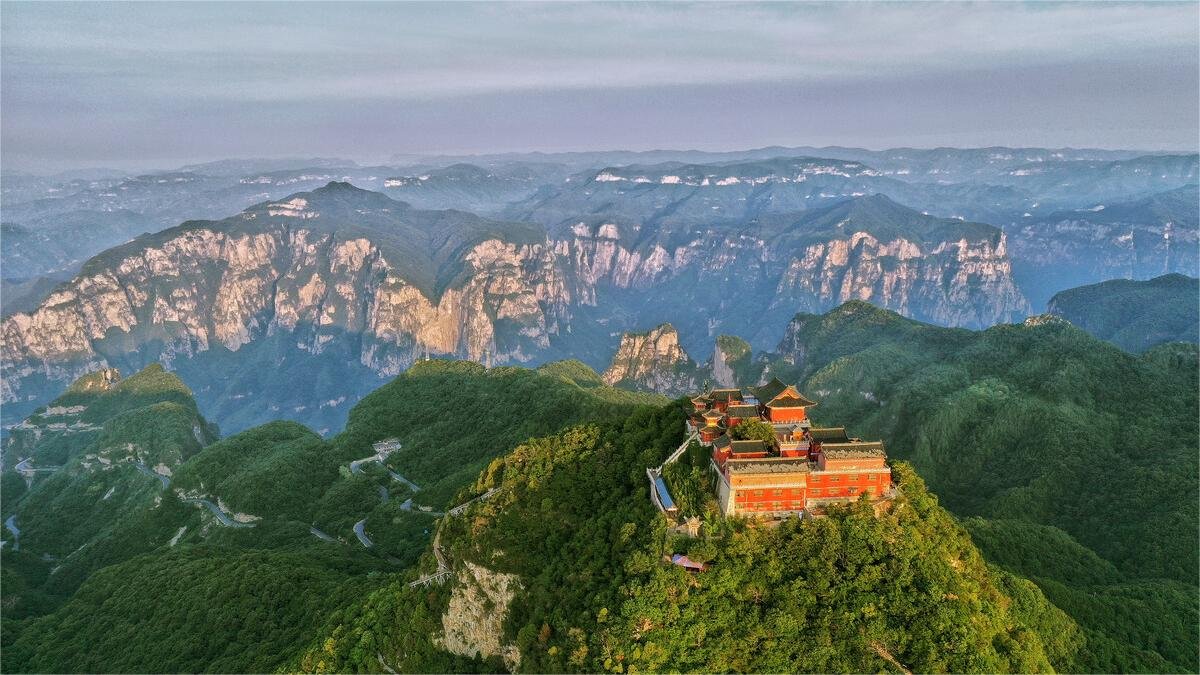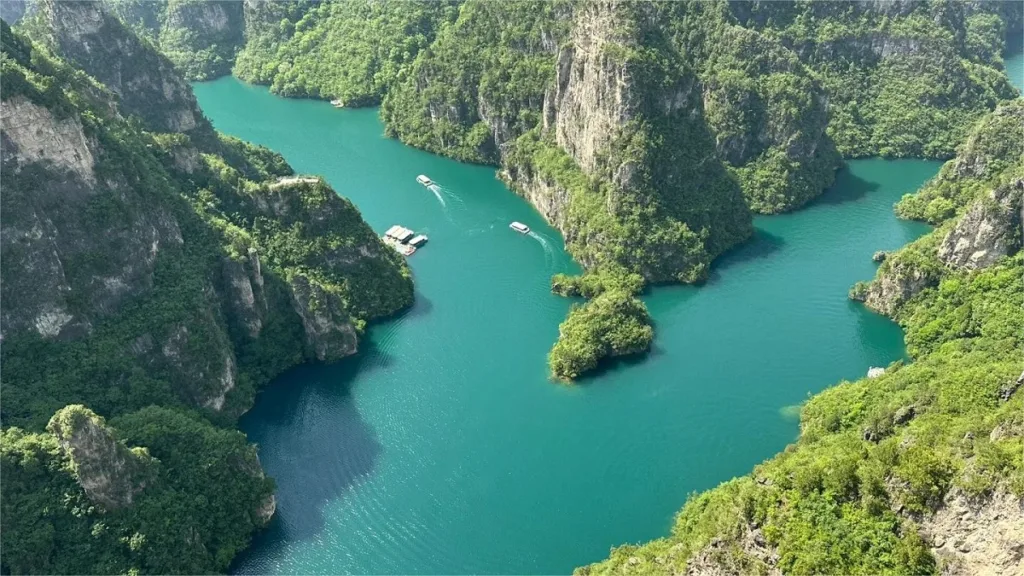Yuntai Mountain Scenic Area (云台山风景区), with a total area of 280 square kilometers, is renowned for its majestic Taihang Mountain ranges, picturesque water landscapes, and canyon-like geological formations. Its name, which translates to “Cloud Platform Mountain,” derives from the perpetual veils of mist and clouds that shroud its peaks and valleys throughout the year due to its rugged terrain.
Featuring prominent attractions such as Hongshi Gorge, Qinglong Gorge, Tanpu Gorge, Quanpu Gorge, Zifang Lake, Zhuyu Peak, Diecai Cave, Mihou Valley, Baijia Rock, and Wanshan Temple, Yuntai Mountain offers a plethora of natural wonders to explore. The main peak, Zhuyu Peak, rises to an elevation of 1297.6 meters, while the Yuntai Tianpu Waterfall at the end of Quanpu Gorge boasts a staggering single-drop descent of 314 meters, making it the tallest waterfall in China and even across Asia, standing as one of Yuntai Mountain’s most iconic landmarks.
Rich in geological remnants, Yuntai Mountain Scenic Area showcases layers of rock formations dating back as far as 3.4 billion years ago. Over the course of 3 billion years, it has witnessed the formation of various geological strata spanning from the Archean, Proterozoic, Paleozoic, to the Cenozoic era. Particularly notable is the intense uplift from recent tectonic movements and the profound erosive action of water over the past 23 million years, which have sculpted the Yuntai Mountain into a landscape characterized by its dramatic cliffs, canyon systems, and dynamic water features such as waterfalls, springs, streams, and pools. Together, these elements form the distinctive “Yuntai Landform” scenery, adding to the allure and fascination of this natural wonder.
Table of Contents
- Basic Information
- Location and Transportation
- Map of Yuntai Mountain
- Highlights of Yuntai Mountain
- Vlog about Yuntai Mountain
- Other Attractions in Jiaozuo
Basic Information
| Estimated Length of Tour | 1 – 2 days |
| Ticket Price | Admission: 120 RMB Shuttle Bus: 60 RMB Nighttime Tour: 90 RMB |
| Cable Car | Zhuyu Peak: Upward: 70 RMB Downward: 65 RMB Round Trip: 120 RMB Fenghuang Ridge: Upward: 70 RMB Downward: 65 RMB Round Trip: 120 RMB |
| Opening Hours | Daytime: 7.00 – 17.00 Nighttime: 19.00 – 21.00 |
| Telephone Number | 0086-0391-7709300 |
Location and Transportation
Yuntai Mountain is nestled within the borders of Xiuwu County in the city of Jiaozuo, Henan Province, China. It stands approximately 30 kilometers away from the downtown area of Jiaozuo city. Travelers have convenient transportation options to reach this natural wonder.
If arriving by high-speed train, visitors can disembark at either Xiuwu West Station or Jiaozuo Station. From Xiuwu West Station, shuttle buses to Yuntai Mountain are available, departing according to the arrival times of the high-speed trains. The journey takes around 40 minutes, with a ticket price of 10 RMB per person.
For those arriving at Jiaozuo Station, the Bus No. 3 provides transportation to Yuntai Mountain. Buses operate from 6:20 AM onwards, departing every 40 minutes. The fare is 4 RMB per person, and during holidays, additional buses may be scheduled to accommodate increased passenger traffic.
Map of Yuntai Mountain

Highlights of Yuntai Mountain
Hongshi Gorge (Red Stone Gorge)

Also known as Wenpanyu, Hongshi Gorge is nestled south of Zifang Lake, stretching a length of 2000 meters with a concealed depth of 68 meters underground. Characterized by its crimson-hued rock formations, Hongshi Gorge exemplifies China’s Danxia landform, with cliff walls adorned in striking red hues, hence its moniker “Red Stone Gorge.” Within the gorge lie a series of enchanting pools named after dragons, forming what is known as the “Nine Dragon Creek,” including White Dragon Pool, Yellow Dragon Pool, Green Dragon Pool, Black Dragon Pool, Resting Dragon Pool, Sleeping Dragon Pool, Awoken Dragon Pool, Child Dragon Pool, and Roaming Dragon Pool. Additionally, visitors can marvel at attractions such as the secluded waterfall, Stone Piercing Cave, Kissing Rocks, Twin Lions Fetching Water Stone, Peacock Spreading Its Tail Stone, and Chessboard Stone. At the southern end of Hongshi Gorge lies a narrow passage aptly named “One-Line Sky,” where the majestic White Dragon Waterfall cascades over 50 meters.
Tanpu Gorge (Pool and Waterfall Gorge)

Situated slightly west of the northern region of Yuntai Mountain, Tanpu Gorge, also known as Xiaozhaigou, serves as one of the sources of Zifang River. Extending over 2000 meters in a north-south direction, Tanpu Gorge is home to a stream named Xiaolong Creek. Among its main attractions are the Crossing Immortal Pool, Lover’s Waterfall, Golden Dragon Lying on Waves, Y-shaped Waterfall, Clear Ripple Pool, Water Curtain Cave, Jadeite Pool, Sword-testing Stone, Butterfly Rock, and Dragon-Phoenix Wall, showcasing a diverse array of cascading waterfalls, bubbling springs, colorful pools, and majestic rock formations. The name “Tanpu Gorge (Pool and Waterfall Gorge” stems from its distinctive landscape, where one encounters a spring every three steps, a waterfall every five steps, and a pool every ten steps.
Zifang Lake

Also known as “Pinghu Lake,” Zifang Lake derives its name from the Han Dynasty recluse Zhang Liang, also known as Zi Fang, who once dwelled in its serene surroundings. Nestled in the eastern region of the Yuntai Mountain Scenic Area, Zifang Lake is the largest body of water, spanning approximately 0.5 square kilometers with a length of around 4000 meters and depths plunging to over 65 meters. At the northern end of the lake, a peak resembling a giant Buddha adds to the picturesque scenery. In June 2002, Zifang Lake made headlines for the discovery of Peach Blossom Jellyfish, a species included in China’s national list of endangered wildlife alongside wild horses and giant pandas. Named for its resemblance to peach blossom petals, the Peach Blossom Jellyfish is one of the most primitive and ancient invertebrates on Earth, with origins dating back 550 million years.
Zhuyu Peak

Known colloquially as Xiaobei Ding or Fu Fu Shan, Zhuyu Peak earns its moniker from its striking resemblance to an overturned cauldron. Rising majestically to an altitude of 1297.6 meters, the summit of Zhuyu Peak is adorned with the Temple of Zhenwu Great Emperor, Tianqiao (Heavenly Bridge), and Yunti (Cloud Ladder). Zhuyu Peak holds literary significance as well, immortalized in the Tang Dynasty poet Wang Wei’s verse from “Remembering My Brothers on the Ninth Day of the Ninth Month”: “Alone in a foreign land as a stranger, Every festive day intensifies longing for kin. I know my brothers climb to lofty heights, Inserting zhuyu, one less person.” Legend has it that Wang Wei penned these lines while gazing upon this very peak. Nestled on the mountainside is the Medicine King Cave, plunging 30 meters deep with a diameter of 10 meters. It is said to be the place where Sun Simiao, a renowned physician of the Tang Dynasty, gathered herbs and concocted elixirs. At the entrance of the Medicine King Cave stands an ancient Metasequoia tree, roughly 20 meters tall with a trunk circumference of three arm spans, lush with foliage and believed to be around a thousand years old. Other notable caves in the vicinity include the Kitchen Cave, Yanwang Cave, and Huangni Cave, numbering over ten in total.
Glass Skywalk

Perched atop Zhuyu Peak, the Fenghuangling Glass Skywalk features dual pathways that offer a thrilling experience suspended high above the cliffs. One pathway curves along the cliffside in a U-shape, while the other stands perpendicular to the precipice, providing unobstructed views of the breathtaking scenery below. With a total length of approximately 400 meters and situated at an altitude of around 1080 meters, these transparent glass walkways, each 1.6 meters wide, offer a spine-tingling adventure. Walking along the Glass Skywalk, visitors are treated to panoramic vistas, encompassing towering mountains and winding valleys, delivering an exhilarating experience of being perched on the edge of a cliff.
Monkey Valley

Established as a national-level macaque nature reserve in August 1998, Monkey Valley is home to a thriving population of wild macaques. These agile primates, known as Taihang macaques, are adept climbers and jumpers, exhibiting remarkable agility and intelligence. As a second-level protected species in China, the Taihang macaques thrive in their natural habitat within Yuntai Mountain Scenic Area, with over a thousand individuals inhabiting the region. Visitors to Monkey Valley can witness these fascinating creatures up close and even enjoy complimentary macaque performances. With six shows daily, visitors have the opportunity to observe the playful antics and impressive behaviors of these enchanting primates, providing a unique and memorable experience amidst the natural splendor of Yuntai Mountain.
Wan Shan Temple

Nestled beneath the towering Yanwang Bi Peak, Wan Shan Temple, dating back to the Ming Dynasty during the Wanli era, holds a rich historical significance. Legend has it that the temple was constructed by the imperial court to pacify the spiritual energies of the royal lineage in the area, earning its name as an imperial gift. Presided over by the venerable Master Hai Kong, a prominent figure in Chinese Vajrayana Buddhism, Wan Shan Temple boasts a 2-meter-tall bronze Buddha statue, a generous gift from Thai overseas Chinese valued at 600,000 RMB. The temple complex also features scenic spots such as the First Spring, Treasure Gathering Basin, Dry Well, Immortal Cave, Stone of Respectable Deeds, and the Lookout Platform for Ancestral Reunions, offering visitors a tranquil retreat amidst the mountain’s splendor.
Baijia Rock

Standing at a height of 170 meters and spanning a kilometer from east to west, Baijia Rock holds historical significance as the birthplace of China’s landscape garden culture, transitioning from imperial courts to folk traditions. During the Han Dynasty, Emperor Xian sought respite from the summer heat in the cool environs of Baijia Rock. In the Wei and Jin Dynasties, it became a sanctuary for seven renowned scholars known as the “Seven Sages of the Bamboo Grove,” including Liu Ling, Xiang Xiu, and Shan Tao, who retreated to the bamboo groves of Baijia Rock for over two decades. Here, they formed friendships with recluses such as Sun Deng and Wang Lie, leaving behind legacies such as the “Sun Deng’s Rostrum,” “Wang Lie’s Spring,” and “Liu Ling’s Sobering Platform.” Baijia Rock is not only a natural marvel but also a testament to the profound influence of Chinese literary and cultural history.








I do not recommend eating at YunTai Mountain! I wouldn’t recommend anywhere inside or outside the scenic area! The food is not tasty, unhygienic, and expensive!